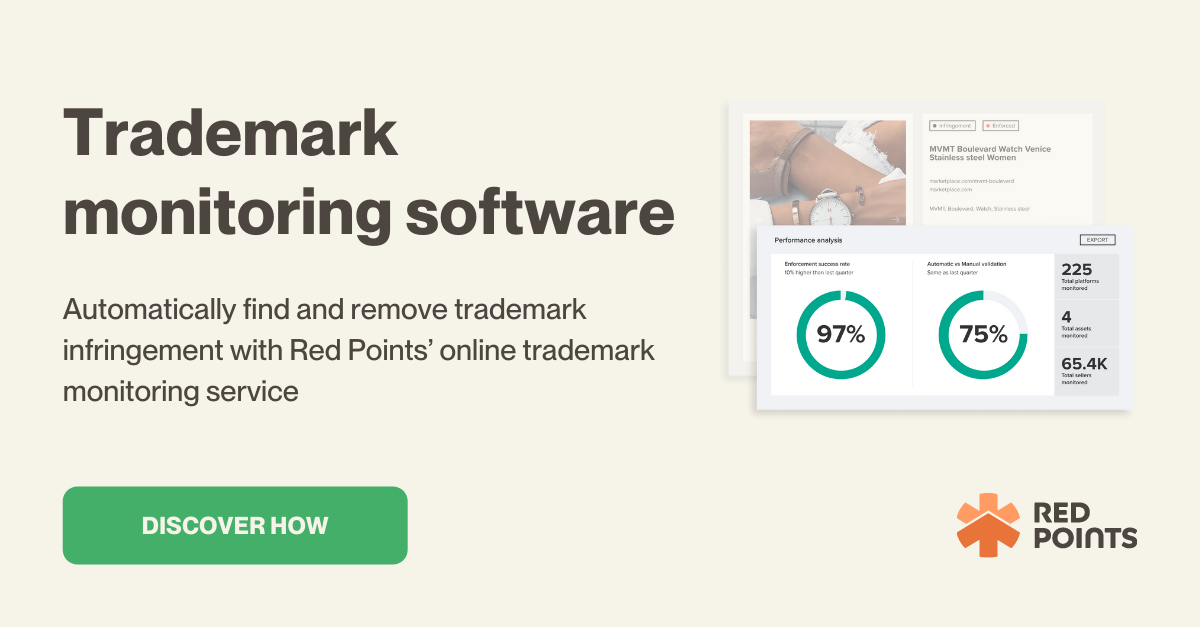Most business owners have heard the term “trademark”, but what does this really mean for your business? While you might not realize it, everyone encounters trademarks on a daily basis. Trademarks are a crucial part of a business’s identity and a valuable asset.
Red Points is here to answer vital business questions such as how do trademarks protect a business, what benefits do trademarks offer, and how to start protecting your business with a trademark. Understanding trademark protection will not only help you grasp how valuable protecting your trademark is, but how a carefully curated trademark can lead to your business’s success.
What is the purpose of a trademark?
A trademark distinguishes a certain seller or good from other companies that sell similar products. Its main purpose is to prevent other companies or infringers from misleading customers to sell their similar product or goods. This helps protect the trademarked business, as it prevents others from piggybacking off their success in a dishonest way.
For example, a trademark would prevent a shoe company from using a swoosh logo similar to Nike’s. This would protect Nike’s trademark, as well as prevent the company from trying to utilize part of Nike’s brand that could confuse consumers. Confusing consumers in this manner is against trademark law.
Trademarking your brand indicates the originality of your product, which is beneficial to your business and to customers. This also gives brands an identity, as well as the opportunity to build a reputation with their customers. This also allows customers to feel comfortable and confident buying a specific brand, as a trademark offers consistency with the level of quality they’ll receive each time.
Why would a business want to protect its trademark?
There are a variety of reasons for a business wanting to protect its trademark. A trademark is a valuable business tool that can help grow their business. Depending on how a business utilizes their trademark, it can help tell a brand’s story, defend their place in the market, and even make hiring easier.
The beauty of a trademark is that, depending on the brand/logo, it can be recognized instantly, regardless of language. This sends a strong message to consumers, especially with brands that are respected and trusted by customers. If a brand like Apple did not protect its trademark, there could be many competitors or infringers misleading customers. This would not only take revenue from Apple but also allow for the possibility of poor-quality products falsely representing their brand.
Protecting a trademark helps ensure situations like this do not occur. Trademark protection also prevents competitors from stealing the hard work of reputable brands. Not only does this ensure your company is better off, but also offers peace of mind to business-owners, as trademark protection will mean one less thing to worry about.
What are the rights of a trademark owner and how can they be enforced?
If you’re registered for trademark rights to your brand, this means your company has official trademark protection for 10 years from registering, which can be renewed every 10 years indefinitely. Some businesses don’t formally register for a trademark, yet still have legal rights and trademark protection; however, it is strongly encouraged to register for a trademark should you look to pursue legal action in a trademark infringement situation.
Having a registered trademark with the U.S. Patent and Trademark Office (USPTO) offers much more protection than opting to not register for trademark protection. This gives your business the ability to notify the public about your trademark, utilize your trademark to distribute your services nationally, file a lawsuit in federal court for infringement, obtain your trademark in other countries, and file with customs to prevent copies of your goods from entering the country. Without trademark protection, it’s more difficult to take legal action against someone with a similar name or product.
Generally, a cease and desist letter is the first course of action for trademark infringement. While this usually will stop any unsavory business with those illegally using your trademark, this isn’t always the case. If this doesn’t solve the issue, your next option is to file a civil action in state or federal court. It’s important to note that legal action can only be enforced if the infringer is actively using your trademarked name or good. While the idea of a lawsuit might sound daunting, remember that the trademark is legally yours and all you need to do is have proof of infringement.
Legal trademark registration gives you the legal right to your trademark, but also means that the responsibility of protecting your trademark falls on your business. Registration simply gives you the right to enact legal action, and it’s up to you whether or not you do so. It’s important to remember that not taking action might weaken your business’s trademark and cost your business revenue. For more information on protecting your trademark by preventing infringement, read Red Points’ guide on trademark infringement.
How does a trademark help a business?
A trademark can help a business simply by being registered and building a presence within the community and with consumers. And, by protecting your trademark right away, sets your business up for long-term success. By immediately creating your business with a strong trademark, it allows you to establish yourself and protect yourself to remain in good standing, both financially and in the public eye.
A trademark does a variety of things for a business, and one of the most important aspects of a trademark is brand recognition. Not only does brand recognition help prevent competitors from copying what you do, it creates a distinct presence for consumers. Many consumers consider themselves as loyal to brands, which is why your trademark is so important. Additionally, when your trademark is seen in a positive light, many might see joining a brand they admire as a great career opportunity, allowing for you to grow your brand with passionate people.
Your trademark can also benefit your company when looking toward expansion. Brand recognition is a huge asset, as a brand’s established presence is more likely to bring in more customers when looking to branch out. If a brand has a particularly positive image, consumers will be more likely to continue to support them, taking their reputation as a sign for how well their business runs. Your brand’s trademark is one of your most important assets, making protecting your trademark crucial to your business success.
What’s next
When it comes to protecting your brand, your trademark plays a prevalent role in deterring competitors and bringing in business. Your business’s trademark protects your business, gives you legal rights against infringement, and is beneficial in growing your brand. Being vigilant isn’t always easy when running a business, but Red Points is here to help with brand protection. See how you can protect your trademark with Red Points.







